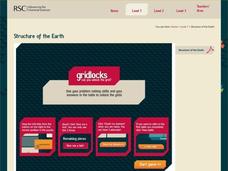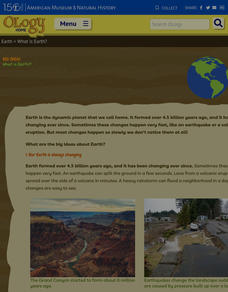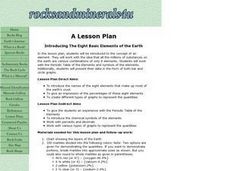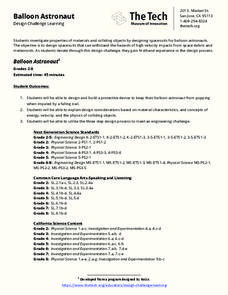Royal Society of Chemistry
Structure of the Earth
What lies beyond the ground beneath our feet? Young geologists learn the four main layers of Earth with an engaging puzzle set. The interactive illustrates each layer, and users must place them correctly before they can progress to the...
American Museum of Natural History
What is Earth?
Humans have only inhabited Earth for a short part of its existence. An online resource explains how scientists use clues from rocks and fossils to piece together information about Earth prior to humans. The online instruction includes...
Curated OER
Earthquakes: Sixth Grade Lesson Plans and Activities
Young seismologists learn more about plate tectonics with a set of pre-lab, lab, and post-lab lessons plans on earthquakes. After exploring how waves travel through various materials, sixth graders record their observations and...
Curated OER
Models of Planets
In this planet models worksheet, students use the radius of a given planet and its mass to answer questions using a model of a planet with a given radius. They determine the volume of the planet's inner core, the volume of its outer...
Curated OER
Space Food
What do astronauts eat in outer space? Kids can read an informational passage to learn about space food. The passage includes prompts that have learners identify the main idea and key details, then write a paragraph summarizing the text....
Curated OER
Eight Basic Elements of the Earth
Pupils identify the concept of an element and work with an idea that all of the millions of substances on the earth are various combinations of only 8 elements. They work with the Periodic Table of the Elements and symbols of the...
Curated OER
Inside Earth
Students study the makeup of the earth, including the core, the mantle and the crust. They compare the temperatures and thicknesses of each layer. In pairs, they make a model of a cross-section of the earth out of modeling clay.
University of Colorado
Looking Inside Planets
Researchers use scientific data to understand what is inside each of the planets. The first in a series of six, this lesson builds off of that concept by having pupils use a data table to create their own scale models of the interiors of...
Reed Novel Studies
Wonder: Novel Study
Beauty is more than skin deep. Auggie, the main character in Wonder, has a facial defect, but his inner beauty shines. Taking a cue from Auggie, scholars learn how a person is more than outer appearance. To finish the resource, they...
Curated OER
The Planet Earth
Students explore the planet Earth, outer space, and Earth's axis. They demonstrate reading comprehension skills, including literal meaning, inference and critical analysis.
Curated OER
Germs and Preventing Illness: An Inner and Outer
First graders looks at germs through a microscope and identify two that can make us sick. They compare their mouth before and after they brush their teeth and practice proper hand washing techniques. They study the impact of Edward...
Chymist
Earth Science
Explore the consistency of the earth's layers and soil through modeling. By conducting an engaging experiment, learners develop a model for the earth's layers and a soil profile using edible materials. Each material is chosen based on...
Curated OER
Earth Movements
In this earth science worksheet, students use the sheet for reinforcing vocabulary and core concepts. The answers are found and reviewed for the attainment of new knowledge.
Curated OER
Plate Tectonics: Third Grade Lesson Plans and Activities
Third graders examine plate movements and boundaries with a lab that demonstrates how volcanoes and earthquakes are formed. It presents different types of stresses an object can withstand through a hands-on...
University of Colorado
Looking Inside Planets
All of the gas giant's atmospheres consist of hydrogen and helium, the same gases that make up all stars. The third in a series of 22, the activity challenges pupils to make scale models of the interiors of planets in order to...
TLS Books
Uranus
After reading an informational text passage, learners answer four multiple choice questions about the third largest planet in our solar system.
Tech Museum of Innovation
Balloon Astronaut
Design protection from high-speed particles. The STEM lesson plan highlights why astronauts need protection from space debris. Pupils use the design process to design, build, and test a spacesuit that will protect a balloon from a...
Starry Night Education
The Stars
Three astronomy activities in one resource! Here you will find one hands-on activity, one demonstration, both with discussion questions, and one activity worksheet. During these lessons young scientists discuss how stars are...
Space Awareness
What is a Constellation
Why do some stars in a constellation appear brighter than others? Using a get-up-and-move astronomy activity, scholars explore perspective and the appearance of constellations in the sky while developing an understanding of the...
Curated OER
English Skills: Vocabulary and Spelling Practice
Learners complete various activities using their spelling words, which are not provided on the worksheet. Activities include using spelling words alliteratively, finding synonyms, using words in sentences with specified parts of speech,...
Curated OER
A Mathematical Model of the Sun
In this mathematical model of the sun worksheet, students read about the way scientists use the sun's radius and mass to determine a mathematical model of the sun using the volume of a sphere, and the relationship between density, volume...
Curated OER
A Galaxy Up Close
In this Sombrero Galaxy worksheet, learners observe infrared images taken by the Spitzer Infrared Telescope and the Hubble Space Telescope. They answer 9 questions about the details of the images such as the radius of the stellar...
Curated OER
Layers Of The Earth
Learners examine the layers of the earth and the basic composition and thickness of each. Using construction paper, each student models the layers of the earth.
Curated OER
Inside the Earth
For this composition of the earth graphic organizer worksheet, students research the relative temperature and composition of the earth's crust, mantle, and core.























